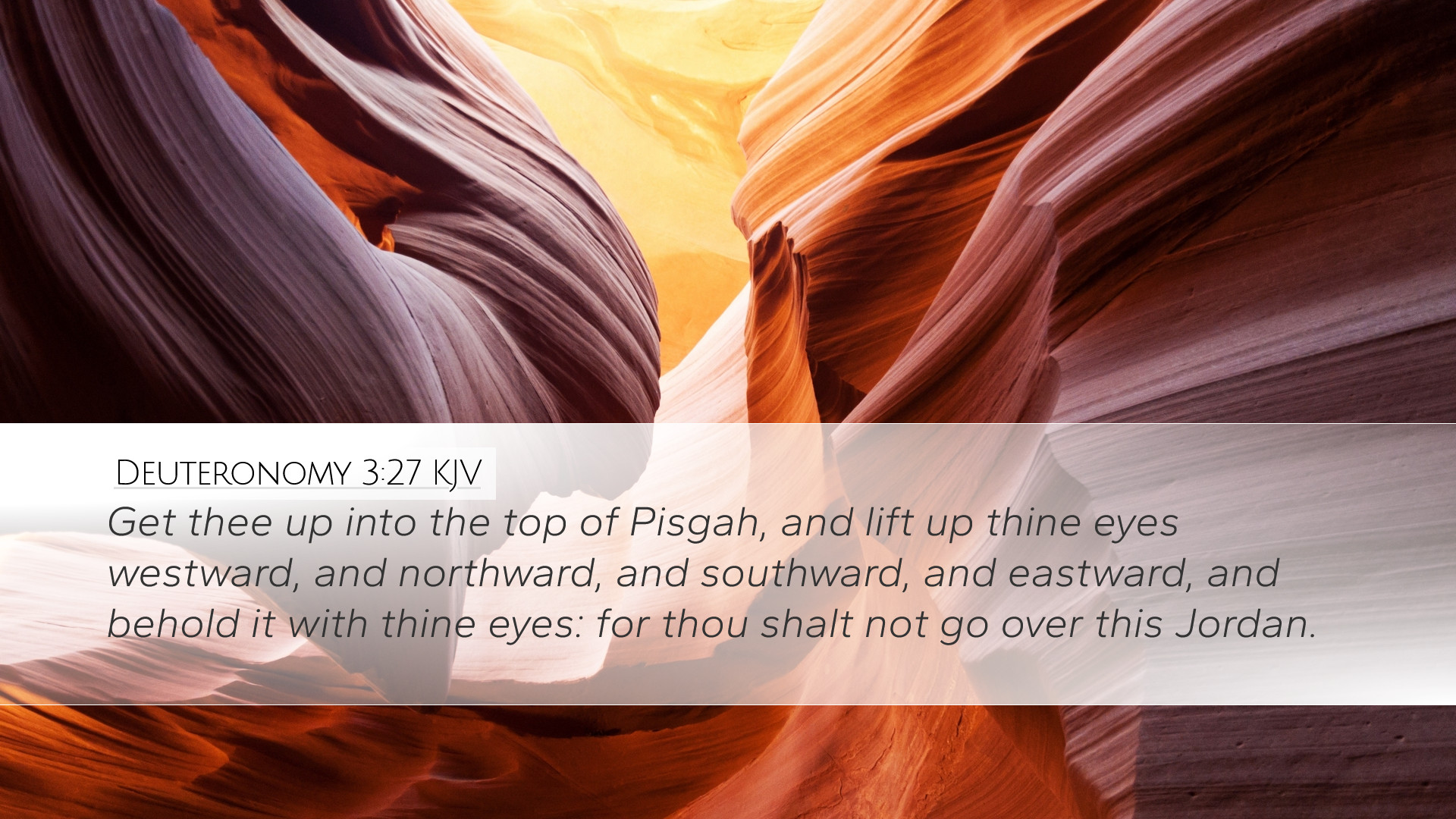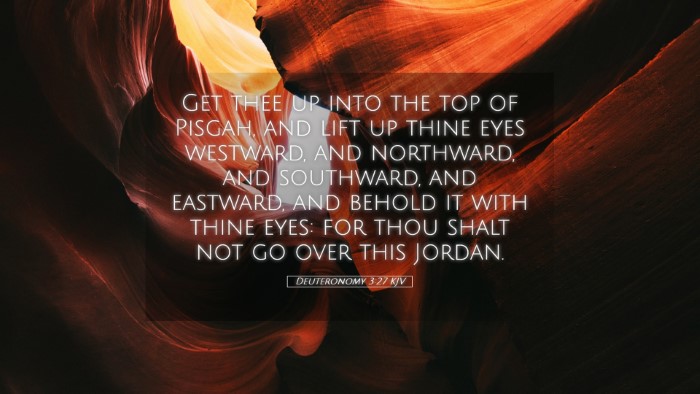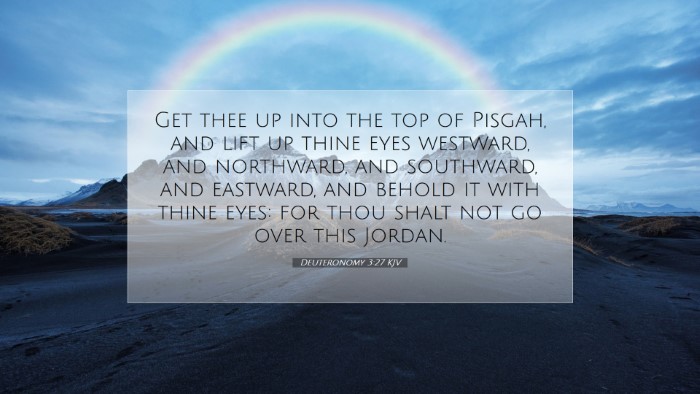Commentary on Deuteronomy 3:27
Deuteronomy 3:27 states: "Get thee up into the top of Pisgah, and lift up thine eyes westward, and northward, and southward, and eastward, and behold it with thine eyes; for thou shalt not go over this Jordan." This verse captures a pivotal moment in the narrative of Moses as he is about to conclude his journey with the Israelites.
Contextual Overview
This passage occurs during the final stages of Moses' life as the Israelites are poised to enter the Promised Land—Canaan. Moses, having led the people through the wilderness for forty years, is now denied entry due to previous disobedience (Numbers 20:12). Thus, this moment somberly emphasizes both the weight of leadership and the consequences of sin.
Commentary Insights
Matthew Henry's Commentary
Matthew Henry notes that this command to view the Promised Land from the summit of Pisgah serves multiple purposes. It acts as a divine consolation for Moses, providing him with a panoramic view of the land he will never enter because of his earlier transgressions. Henry articulates that while Moses cannot physically enter Canaan, this moment emphasizes God's faithfulness in fulfilling His promises to the descendants of Abraham, Isaac, and Jacob.
Henry goes on to proclaim the spiritual lesson found within this verse: believers are encouraged to lift their eyes towards the promise, even if they cannot partake directly in the bounty. This invites reflection on the broader concept of faith and obedience.
Albert Barnes' Notes
Albert Barnes provides an additional layer to understanding the significance of Pisgah’s summit. He asserts that this location was not merely a geographical site, but a sacred place of understanding and vision. Barnes explains that the act of lifting one’s eyes is metaphorical for gaining spiritual insight. He highlights that in viewing the land, Moses is reminded of God’s unchanging purpose and covenant with His people.
Furthermore, Barnes emphasizes the sorrow accompanying the command and the bittersweet nature of Moses’ journey. His frustration and disappointment are palpable, yet it is through this lens that one sees the character of God, who nevertheless allows a glimpse of the future despite present consequences.
Adam Clarke's Commentary
Adam Clarke adds depth by elucidating the geographical significance of Pisgah—a place that offered an expansive view not only of Canaan but also of the wilderness that the Israelites traversed. Clarke points out that seeing the entirety of the Promised Land embodies hope for Israel, despite Moses' exclusion. In his reflection, Clarke concerns himself with the promise of continuity through Joshua’s leadership, who will guide the Israelites into Canaan.
Clarke also interprets the command to "lift up thine eyes" as a divine invitation to behold God’s glory and the fullness of His plans. He suggests that there is an important theological reflection on the nature of God’s promises: they are often seen only in part, leading to the development of faith in anticipation of the future unfolding of God's purposes.
Theological Reflections
Theologically, Deuteronomy 3:27 invites believers to confront the realities of disappointment, unfulfilled personal desires, and the larger narrative of God’s salvation history. Several key reflections arise:
- The Promises of God: The view from Pisgah emphasizes that while individual journeys may end in unexpected ways, God's overarching plan continues. It serves as an encouragement to all leaders who may one day find themselves in similar positions.
- Visions Beyond Self: This verse underscores the vital importance of vision that extends beyond one's immediate situation. Moses is shown the fruit of his labor in leading Israel; though he does not enter, his life’s work leads to the fulfillment of God’s promise.
- Hope and Faith: The element of hope resonates; every believer is called to lift their eyes toward the promise, trusting in God’s faithfulness despite personal barriers and limitations.
Practical Applications
For pastors, students, theologians, and scholars, the implications of Deuteronomy 3:27 are numerous:
- It highlights the significance of leadership accountability and the serious consequences of disobedience.
- This passage encourages reflection on one's journey, prompting the question: How does my personal commitment to God influence my ability to lead and guide others?
- It invites an evaluation of our focus—are we spiritually lifting our eyes to the promises of God, even when our paths seem blocked?
- The themes of consolation and hope can be particularly poignant in counseling situations, where individuals may feel they are on the brink of despair.
Conclusion
Deuteronomy 3:27 serves as a powerful reminder of the narrative arc of Moses, illustrating the balance of human frailty and divine faithfulness. It encourages readers to embrace a broader vision beyond personal desires, leading to a deeper understanding of the continuous work of God in history and the individual. Through Moses' ascent and his view of the Promised Land, we grasp profound theological insights about God's promises, hope, and the importance of obedience.


